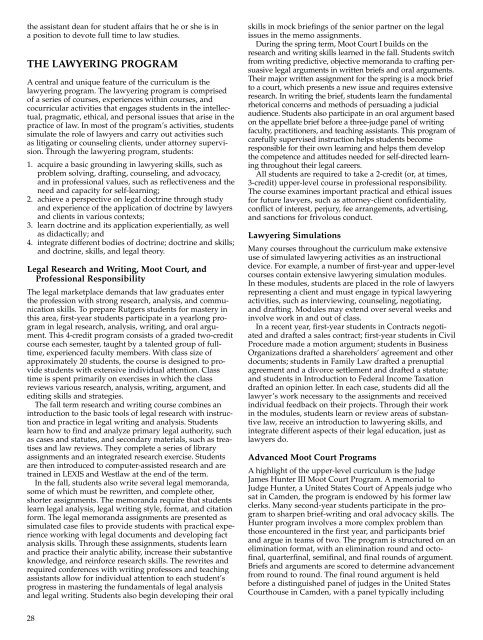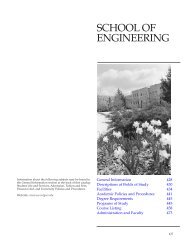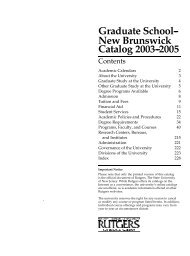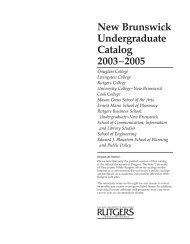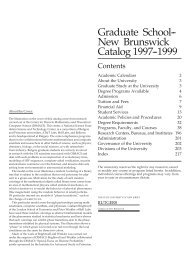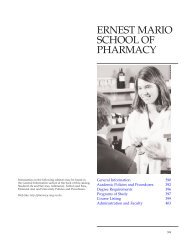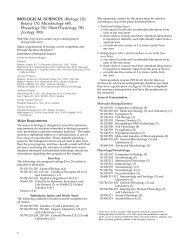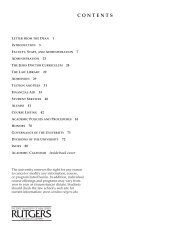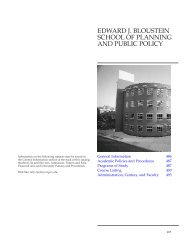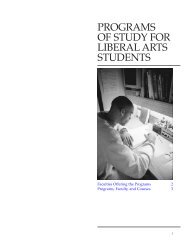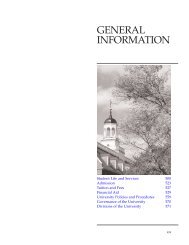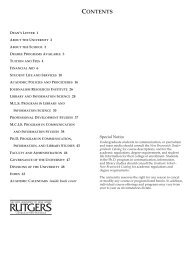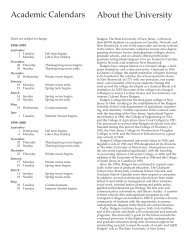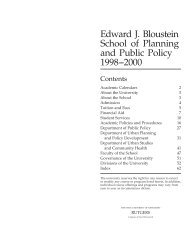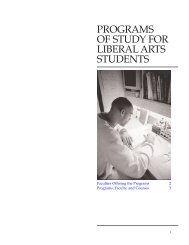Rutgers University School of Law-Camden - Catalogs - Rutgers, The ...
Rutgers University School of Law-Camden - Catalogs - Rutgers, The ...
Rutgers University School of Law-Camden - Catalogs - Rutgers, The ...
Create successful ePaper yourself
Turn your PDF publications into a flip-book with our unique Google optimized e-Paper software.
the assistant dean for student affairs that he or she is in<br />
a position to devote full time to law studies.<br />
THE LAWYERING PROGRAM<br />
A central and unique feature <strong>of</strong> the curriculum is the<br />
lawyering program. <strong>The</strong> lawyering program is comprised<br />
<strong>of</strong> a series <strong>of</strong> courses, experiences within courses, and<br />
cocurricular activities that engages students in the intellectual,<br />
pragmatic, ethical, and personal issues that arise in the<br />
practice <strong>of</strong> law. In most <strong>of</strong> the program’s activities, students<br />
simulate the role <strong>of</strong> lawyers and carry out activities such<br />
as litigating or counseling clients, under attorney supervision.<br />
Through the lawyering program, students:<br />
1. acquire a basic grounding in lawyering skills, such as<br />
problem solving, drafting, counseling, and advocacy,<br />
and in pr<strong>of</strong>essional values, such as reflectiveness and the<br />
need and capacity for self-learning;<br />
2. achieve a perspective on legal doctrine through study<br />
and experience <strong>of</strong> the application <strong>of</strong> doctrine by lawyers<br />
and clients in various contexts;<br />
3. learn doctrine and its application experientially, as well<br />
as didactically; and<br />
4. integrate different bodies <strong>of</strong> doctrine; doctrine and skills;<br />
and doctrine, skills, and legal theory.<br />
Legal Research and Writing, Moot Court, and<br />
Pr<strong>of</strong>essional Responsibility<br />
<strong>The</strong> legal marketplace demands that law graduates enter<br />
the pr<strong>of</strong>ession with strong research, analysis, and communication<br />
skills. To prepare <strong>Rutgers</strong> students for mastery in<br />
this area, first-year students participate in a yearlong program<br />
in legal research, analysis, writing, and oral argument.<br />
This 4-credit program consists <strong>of</strong> a graded two-credit<br />
course each semester, taught by a talented group <strong>of</strong> fulltime,<br />
experienced faculty members. With class size <strong>of</strong><br />
approximately 20 students, the course is designed to provide<br />
students with extensive individual attention. Class<br />
time is spent primarily on exercises in which the class<br />
reviews various research, analysis, writing, argument, and<br />
editing skills and strategies.<br />
<strong>The</strong> fall term research and writing course combines an<br />
introduction to the basic tools <strong>of</strong> legal research with instruction<br />
and practice in legal writing and analysis. Students<br />
learn how to find and analyze primary legal authority, such<br />
as cases and statutes, and secondary materials, such as treatises<br />
and law reviews. <strong>The</strong>y complete a series <strong>of</strong> library<br />
assignments and an integrated research exercise. Students<br />
are then introduced to computer-assisted research and are<br />
trained in LEXIS and Westlaw at the end <strong>of</strong> the term.<br />
In the fall, students also write several legal memoranda,<br />
some <strong>of</strong> which must be rewritten, and complete other,<br />
shorter assignments. <strong>The</strong> memoranda require that students<br />
learn legal analysis, legal writing style, format, and citation<br />
form. <strong>The</strong> legal memoranda assignments are presented as<br />
simulated case files to provide students with practical experience<br />
working with legal documents and developing fact<br />
analysis skills. Through these assignments, students learn<br />
and practice their analytic ability, increase their substantive<br />
knowledge, and reinforce research skills. <strong>The</strong> rewrites and<br />
required conferences with writing pr<strong>of</strong>essors and teaching<br />
assistants allow for individual attention to each student’s<br />
progress in mastering the fundamentals <strong>of</strong> legal analysis<br />
and legal writing. Students also begin developing their oral<br />
skills in mock briefings <strong>of</strong> the senior partner on the legal<br />
issues in the memo assignments.<br />
During the spring term, Moot Court I builds on the<br />
research and writing skills learned in the fall. Students switch<br />
from writing predictive, objective memoranda to crafting persuasive<br />
legal arguments in written briefs and oral arguments.<br />
<strong>The</strong>ir major written assignment for the spring is a mock brief<br />
to a court, which presents a new issue and requires extensive<br />
research. In writing the brief, students learn the fundamental<br />
rhetorical concerns and methods <strong>of</strong> persuading a judicial<br />
audience. Students also participate in an oral argument based<br />
on the appellate brief before a three-judge panel <strong>of</strong> writing<br />
faculty, practitioners, and teaching assistants. This program <strong>of</strong><br />
carefully supervised instruction helps students become<br />
responsible for their own learning and helps them develop<br />
the competence and attitudes needed for self-directed learning<br />
throughout their legal careers.<br />
All students are required to take a 2-credit (or, at times,<br />
3-credit) upper-level course in pr<strong>of</strong>essional responsibility.<br />
<strong>The</strong> course examines important practical and ethical issues<br />
for future lawyers, such as attorney-client confidentiality,<br />
conflict <strong>of</strong> interest, perjury, fee arrangements, advertising,<br />
and sanctions for frivolous conduct.<br />
<strong>Law</strong>yering Simulations<br />
Many courses throughout the curriculum make extensive<br />
use <strong>of</strong> simulated lawyering activities as an instructional<br />
device. For example, a number <strong>of</strong> first-year and upper-level<br />
courses contain extensive lawyering simulation modules.<br />
In these modules, students are placed in the role <strong>of</strong> lawyers<br />
representing a client and must engage in typical lawyering<br />
activities, such as interviewing, counseling, negotiating,<br />
and drafting. Modules may extend over several weeks and<br />
involve work in and out <strong>of</strong> class.<br />
In a recent year, first-year students in Contracts negotiated<br />
and drafted a sales contract; first-year students in Civil<br />
Procedure made a motion argument; students in Business<br />
Organizations drafted a shareholders’ agreement and other<br />
documents; students in Family <strong>Law</strong> drafted a prenuptial<br />
agreement and a divorce settlement and drafted a statute;<br />
and students in Introduction to Federal Income Taxation<br />
drafted an opinion letter. In each case, students did all the<br />
lawyer’s work necessary to the assignments and received<br />
individual feedback on their projects. Through their work<br />
in the modules, students learn or review areas <strong>of</strong> substantive<br />
law, receive an introduction to lawyering skills, and<br />
integrate different aspects <strong>of</strong> their legal education, just as<br />
lawyers do.<br />
Advanced Moot Court Programs<br />
A highlight <strong>of</strong> the upper-level curriculum is the Judge<br />
James Hunter III Moot Court Program. A memorial to<br />
Judge Hunter, a United States Court <strong>of</strong> Appeals judge who<br />
sat in <strong>Camden</strong>, the program is endowed by his former law<br />
clerks. Many second-year students participate in the program<br />
to sharpen brief-writing and oral advocacy skills. <strong>The</strong><br />
Hunter program involves a more complex problem than<br />
those encountered in the first year, and participants brief<br />
and argue in teams <strong>of</strong> two. <strong>The</strong> program is structured on an<br />
elimination format, with an elimination round and oct<strong>of</strong>inal,<br />
quarterfinal, semifinal, and final rounds <strong>of</strong> argument.<br />
Briefs and arguments are scored to determine advancement<br />
from round to round. <strong>The</strong> final round argument is held<br />
before a distinguished panel <strong>of</strong> judges in the United States<br />
Courthouse in <strong>Camden</strong>, with a panel typically including<br />
28


